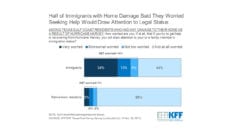Suppose you are in the United States on a student visa and want to enroll in a Marketplace plan. Or maybe you are on an H1-B work visa and want to enroll your newborn in WIC. Sure, why not? Well, do you want to stay? Then, not so fast. The Trump administration is pushing for a revision of the “public charge” rules, which could force non-citizens living here legally to choose between popular benefits and their future immigration status.
What is the Public Charge Rule?
For over 100 years, public charge regulation has played a role in who is allowed to legally immigrate into and remain in the United States as a permanent resident. The roots of this type of regulation stretch back to colonial times when “colonists were especially reluctant to…welcome…impoverished foreigners.” These rules provide a legal basis to discriminate against those in need, creating a disincentive for immigration by those who would rely upon public support.
For nearly two decades, “non-cash benefits,” like tax credits (e.g., Earned Income Tax Credit) and in-kind benefits (e.g., health insurance, nutrition support) have been excluded from such determinations. For example, “lawfully present” immigrants must generally wait five years before being eligible for Medicaid, but many can apply for coverage and get financial help in the Marketplace. (Oh, except if you here under Deferred Action for Childhood Arrivals, then you cannot participate in the Marketplace at all.) The complex patchwork of qualifying statuses for various programs is already a barrier to participation since many do not know that they are eligible.
The Leak
A draft proposal modifying the public charge rules leaked in March, broadening them to include those receiving “almost any form of welfare or public benefit, even popular tax deductions.” This would expand the scope of public charge determinations from about 3% of non-citizens to 47% under the draft rule. Benefits used by dependents, even those who are citizens, could factor in. Also, the current standard of being “primarily dependent” on government support for considering one to be a public charge would change to receiving nearly “any government assistance,” excluding only those receiving very low value of benefits (i.e., less than $1 per day for a single person). These changes could easily be framed as conserving resources for citizens and permanent residents, which is objectively defensible at face value. But this rationale ignores the larger context and apparent motives behind these changes.
How Would These Changes Affect Families?
Nearly 15% of the 27.5 million uninsured are ineligible for ACA coverage due to their own immigration status (e.g., undocumented, DACA). However, there are another 10 million children who are citizens with non-citizen parents. These children are not only at risk for separation if their parents are forced to leave, but this could also have the (un)intended consequence of discouraging parents from signing their children up for programs like WIC and Medicaid.
There was a “chilling effect” of being in a mixed status household on Medicaid coverage prior to the 2016 election, likely deepening to a freeze with the anti-immigrant stance of this administration. In a country where Latinxs are already disproportionately more likely to be uninsured, a further disincentive to participation in widely used programs would make climbing the economic ladder even more difficult.
The republic sits at an ethical crossroads. From remarks by then-candidate Trump about Mexican “rapists” to tweets about “infestation” by MS-13 and a reprehensible family separation policy, this administration continues its anti-immigrant assault. This change to the public charge rules would represent an insidious new low in how we treat immigrants in America. We should push the administration and Congress to enact comprehensive immigration reform rather than using regulation to institutionalize and further widen economic and health disparities between immigrants, particularly those in the United States legally, and their neighbors.
Feature image: jordi.martorell, Statue of Liberty? (detail), used under CC BY-NC-ND 2.0














